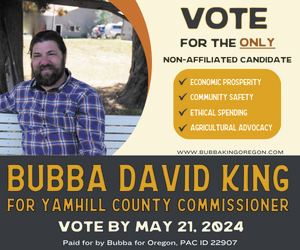Sal Peralta and Rob Harris: Two-party system just isn’t working

Democracies fail when the institutions of government fail to address the major issues of the day or public confidence deteriorates to the point that governing becomes impossible.
America is in danger of becoming a failed democracy and, by extension, so is Oregon. If that seems overblown, consider this:
A recent poll by the Associated Press revealed that: Only 1 in 10 U.S. adults gives our government high ratings for the way democracy is working; 53% say Congress does a poor job of upholding democratic values; and large majorities are dissatisfied with how our government is handling major issues, including the economy, government spending, gun policy, immigration and abortion.
These results are related. There are broadly supported solutions to each of the unresolved major issues, for example, but those solutions are unattainable by our politicians.
Watching Oregon’s most recent legislative session — how it was conducted, and its aftermath — it’s easy to see how this failure of our democratic governance is affecting us here.
A recent Viewpoints commentary by Randy Stapilus (July 7) detailed some of the mechanics of Oregon’s most recent dysfunctional legislative sessions, with Senate Republicans and our own state senator, independent Brian Boquist, refusing for more than six weeks to provide a quorum that would allow the Senate to pass legislation.
While a technical fix to the quorum requirement can be made to bring Oregon into line with the other 45 states, it will do nothing to address the underlying polarization between the major parties and their leaders, nor the alienation and the lack of representation of most Americans who just want our election system to elect leaders who fairly represent our broadly shared interests.
A two-party system — where only the Democratic and Republican nominees are viable candidates — can work. It has worked in the past.
But it requires wide membership and a big tent philosophy anchored in good faith cooperation and principled compromise. And we have none of that today.
A healthy democracy requires wide representation. But over the past 40 years, millions of Americans have left the Democratic and Republican parties.
In 1982, some 96.7% of Oregonians were registered with one of the two major parties, down from 99.8% four years earlier.
Today, just 58% of Oregonians are registered as either Democratic or Republican. A plurality of Oregonians, more than a million people, don’t claim affiliation to any political party.
This creates a particular problem in Oregon, where our closed primary elections shut out the 42% of voters who are not members of a major party.
That prevents them from voting for partisan nominees for governor, the state legislature and Congress. It leaves decisions in the hands of the fraction of voters registered in one of the two major parties.
Those primary voters don’t represent all Oregonians, and tend to reward candidates appealing to party loyalty and ideological purity rather than the values of good governance. Being a “fighter” is a badge of honor in Oregon’s partisan primaries, even though it is proven to produce very poor performers in actual office.
The current two-party system also punishes principled compromise. It punishes those who show some modest independence from their party catechisms.
To see how this has played out in Oregon, consider the case of state representative, Charlie Conrad, R-Dexter — a third-generation Oregonian who has served as a corrections and police officer in Lane County.
In 2023, Conrad was one of the most highly effective legislators in the state, in terms of both bringing resources into his district and performing well overall. His voting record ran conservative, but he cast bi-partisan votes on a few environmental issues, and on HB 2002, which strengthens Oregon laws to protect women’s reproductive rights and access to affirming care for people dealing with gender identity issues.
Conrad wrote a three-page statement explaining his vote on HB 2002, and what he said was unusual in today’s political climate.
Rather than trying to win an argument, Conrad instead offered the analysis that led him to his vote. He concluded:
“The subject matters addressed in this bill, abortion and gender affirming care, are emotional topics both nationally and in Oregon, particularly when minors are involved. The crux of this bill does not change existing practices, which ensure that every patient’s healthcare needs are met by protecting their freedom to make independent healthcare decisions with the support of their family and medical professionals. To meet people’s needs, healthcare providers need the ability to provide services unfettered by public opinion and harassment, or by government interference.” (https://www.oregonlegislature.gov/pcive/HB 2002-B Conrad 5-2-2023.pdf)
Whether one agrees or disagrees with his position, it seems clear that Conrad made a good faith effort to understand the policy and govern responsibly. In response, he is now being threatened with recall and primary challenges by Lane County’s GOP central committee, Oregon Right to Life and the Oregon Firearms Federation — the latter despite having a 100% voting record on gun rights.
Finally, some Oregon legislative leaders have shown a poverty of good faith compromise.
At the start of Oregon’s legislative session, Tim Knopp, the minority leader behind the Republicans’ third walkout in the last four legislative sessions, called Rob Wagner “untrustworthy” and “deeply partisan,” alleging he lacks “the necessary skills to run the Senate in a bipartisan fashion.”
That’s not exactly the spirit of cooperation Oregonians should expect from our leaders.
But his comments reflect more than just personal animosity. They reflect the polarization tied to a major cultural shift in this country — one that is making our major parties smaller, more ideologically rigid and less willing to compromise.
Yes, we could change the quorum requirement to avoid future walkouts, but that begs the question, why did Republicans walk out in the first place? You can point to specific bills and policies, but at the end of the day, those ended up getting resolved, albeit with acrimony rather than good faith cooperation.
Increasingly, policy is being negotiated behind closed doors among a small number of Democratic legislators and special interest allies. The Democratic caucus is then being instructed to vote the party line on that policy.
That eliminates all representation for 40% of Oregonians and a good deal of it for another big chunk.
It also deprives Democratic legislators who aren’t party to the internal discussions of a chance to voice either their own view or those of their constituents.
While Republicans are not entitled to dictate policy, they are entitled to at least the opportunity to submit input for honest consideration. And this should be done in public, not in small back rooms.
What are the solutions?
Reform to our primary election system to reward thoughtful policy discussion rather than hyper-partisan attack ad exchanges. A more open primary process. Open public policy debates with all representatives involved.
All these changes would reduce the power of the current moneyed interests and create more competition for public office.
Paradoxically, that makes these important changes difficult to achieve. But they represent the only viable path to restoring the health of our democracy through broad participation, principled compromise and good faith cooperation.
Guest writers Sal Peralta and Rob Harris share a passion for principled independence in political thought and policymaking. They are champions of open primaries, ranked-choice voting and issue-oriented campaigns free of unfettered infusions of cash. Peralta helped found the Independent Party of Oregon and has long served as party secretary. He mounted campaigns for state representative and county commissioner before winning a seat on the McMinnville City Council. Harris is a veteran Washington County defense lawyer who has served on the school board, library board and other entities in his hometown of Hillsboro.










Comments